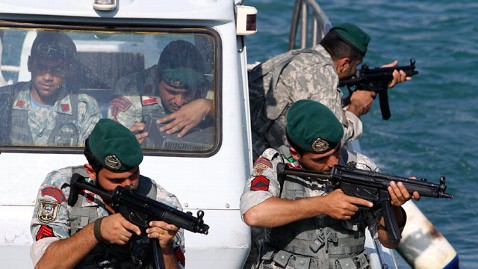US-Iran Tensions Flare After Carrier Transited Strait of Hormuz

Iranian navy members take positions during a drill in the Sea of Oman, Dec. 28, 2011. Iran's navy chief warned that his country can easily close the strategic Strait of Hormuz at the mouth of the Persian Gulf. - Ali Mohammadi/IIPA/AP Photo
Tension between Iran and the United States in the Strait of Hormuz increased again Thursday as an Iranian military official told the official IRNA news agency its planes had shot photographs and video of a US aircraft carrier in the strategic narrow waterway in the Persian Gulf.
According to the Associated Press, Rear Adm. Mahmoud Mousavi was quoted saying the photos are evidence that Iran's navy is "observing moves by foreign forces" not far from where Iranian ships are conducting military exercises. The Strait of Hormuz is a vital transit point for up to 20 percent of the world's oil supply. Only a few dozen miles wide at its narrowest point, it lies between Iran, the United Arab Emirates, and Oman. Iran said this week it would choke off that supply if the United States and its allies imposed sanctions on Iran's oil sector.
The US Navy's Fifth Fleet, which is based in Bahrain across from Iran and guards the passageway, confirmed to ABC News that two of its ships did pass through the Strait of Hormuz on Dec.27 en route to the Arabian Sea where they are assisting operations in Afghanistan.
"The aircraft carrier USS John C. Stennis (CVN 74) and guided-missile cruiser USS Mobile Bay (CG 53), conducted a planned, routine transit through the Strait of Hormuz, Dec. 27. "The ships completed a port visit in Jebel Ali, UAE, and transited the Strait, in order to provide air support to Operation Enduring Freedom from the North Arabian Sea," Fifth Fleet spokeswoman Lt. Rebecca Rebarich said in an emailed response to questions about the Iranian report.
Lt Rebarich said Fifth Fleet's regular contacts with Iran's Navy "continues to be within the standards of maritime practice, well known, routine and professional," but she added that "It is not standard practice to share our transits due to operational security."
The Pentagon said yesterday it would not allow Iran to follow through on its threats.
"Closing the Strait of Hormuz will not be tolerated," spokesman George Little told ABC News. He said Iran was entitled to conduct its military exercises, but added that "raising the temperature on tensions is unhelpful."
The State Department dismissed Iran's threat as "rhetoric."
The United States is preparing new sanctions which could target Iran's Central Bank, which processes the country's oil payments. Doing so would effectively cut off Iran's oil sector. The Obama administration has been discussing the measure with allied oil-rich countries like Saudi Arabia who could increase production to offset the loss of Iran's oil on the global market, which would likely raise oil prices around the world. On Wednesday Saudi Arabia said was prepared to increase production if needed.
If Iran were to cut off oil shipments through the Strait of Hormuz, experts say that would almost surely lead to a spike in oil prices but it would also hurt Iran as well.
"Iran depends on the strait to export its own oil, which generates about $80 billion in earnings and about 60 percent of its budget," Daniel Yergin, the chairman and founder of IHS Cambridge Energy, wrote in his book "The Quest: Energy, Security, and the Remaking of the Modern World."
Here is Tuesday's World News report from Cecilia Vega: